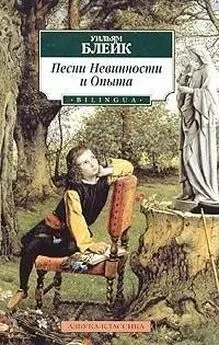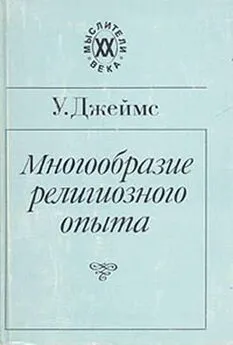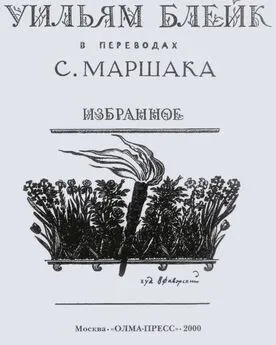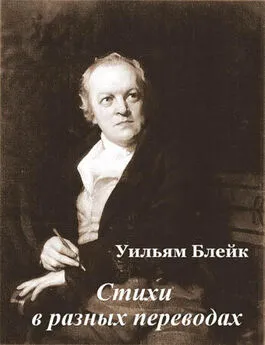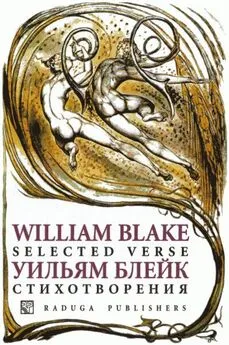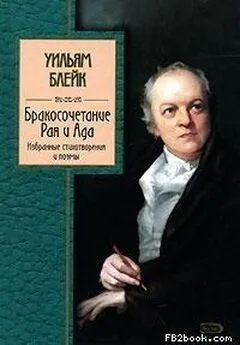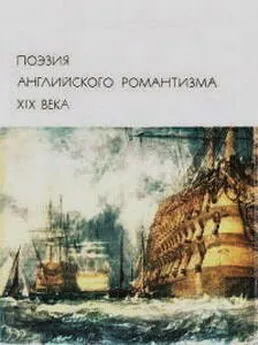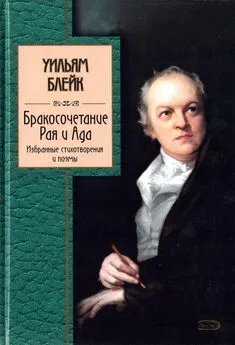Уильям Блейк - Песни Невинности и Опыта
- Название:Песни Невинности и Опыта
- Автор:
- Жанр:
- Издательство:Азбука-классика
- Год:2004
- Город:Санкт-Петербург
- ISBN:5-352-01137-2
- Рейтинг:
- Избранное:Добавить в избранное
-
Отзывы:
-
Ваша оценка:
Уильям Блейк - Песни Невинности и Опыта краткое содержание
Открытие Уильяма Блейка, поэта, художника, визионера, опередившего свое время на целое столетие, произошло лишь во второй половине XIX века: поэты-романтики увидели в нем собрата по духу. К началу XX столетия его творчество получило всеобщее признание. Блейк стал культовой фигурой в кругу английских символистов. Его поэзия по праву заняла одно из ведущих мест в богатейшем литературном наследии Англии. Представленные в настоящем издании «Песни Невинности и Опыта», а также «пророческие» поэмы «Книга Тэль», «Бракосочетание Неба и Ада» публикуются на двух языках, что дает возможность в полной мере оценить неповторимое своеобразие поэзии Блейка.
Песни Невинности и Опыта - читать онлайн бесплатно полную версию (весь текст целиком)
Интервал:
Закладка:
«Владычица долин! Твои стенанья, — сказала деве Глина, —
Я слышала — и призвала их долу.
Не войдешь ли, Владычица, в мой дом? Дано тебе войти
И выйти — не страшись! Ступай вперед невинною стопою».
Решетку вечных врат приподнял Привратник страшный,
И Тэль вошла и увидала неведомую землю.
Ей ложа мертвецов открылись, открылись корни
Сердец живущих, тревожащие шевеленьем глубь —
Юдоль скорбей и слез, не знавшая вовек улыбки.
Брела она в юдоли туч и тьмы, внимая
Стенаниям, и подле свежевырытых могил
Прислушивалась к голосам земли в молчаньи,
Покуда к собственной могиле не пришла. Присела там,
И скорбный стон из пустоты провала к ней донесся:
«Зачем не в силах Ухо не внимать себе погибель?
Зачем распахнутое Око емлет яд улыбки?
Зачем у Век полно в колчане стрел, готовых к делу,
Как воинов бесчисленная рать, сидящая в засаде?
Зачем ласкающее Око сулит дары и злато?
Зачем язык вкушает мед горячего дыханья?
Зачем все звуки в улитку тянет Ухо?
Зачем раздувшиеся Ноздри, трепеща, вдыхают страх?
Зачем нежнейшею уздой придержан пылкий отрок?
Зачем легчайший полог плоти над ложем нашей страсти?»
И Дева содрогнулась, и с воплями бежала мест сих,
Пока не возвратилась без препон в долины Гара.
КОНЕЦ
* Комментарии *
Книга Тэль
«Книга Тэль» — вторая из «пророческих поэм» Блейка (ей предшествовал только «Тириэль»). «Книга Тэль» была завершена и награвирована в 1789 году и относится к периоду, «промежуточному» между «Песнями Невинности» и «Песнями Опыта». Тэль — один из первых «эмблематических персонажей» Блейка, символизирующий чистую душу, «Неопытную Невинность», которая, с одной стороны, тяготится своей неопытностью, а с другой — не в силах воспринять Опыт и в ужасе бежит от него.
Девиз Тэль — две пары образов этого четверостишия задают две основные темы повествования: Орел символизирует небесное (Невинность), Крот — земное (Опыт); жезл и чаша обозначают мужское и женское начала и одновременно чувственную любовь.
Адона — видимо, имеется в виду река Адонис, упомянутая в «Потерянном Рае» Мильтона. Долины Гара — блейковский пасторальный мир, царство Невинности, являющееся «соответствием» миру небесному. Его отличие от мира «Песен Невинности» заключается в том, что здесь царствует непонятная для Тэль чувственная любовь (о которой говорят Облачко и Глина), и в целом этот мир, где каждому отведена своя, естественная роль, где все обречено на конечное умирание, по-своему близок к «натуралистическому» миру «Песен Опыта», Гар и Хева — «эмблематические персонажи», обозначающие прародителей рода человеческого; появляются еще в «Тириэле».
Лилия и Глина, (ср. образы в «Песнях Опыта») — обозначают «Опытную Невинность», более близкую Блейку в этот период, чем невинность Тэль. Чисто «земная» сущность этих персонажей лишний раз подчеркивает движение Блейка к «натуралистическому» мировоззрению.
Лува — в блейковской мифологии — второй Зоа, символизирующий чувственное и эмоциональное в человеке.
Зачем не в силах… — речь здесь идет о пяти чувствах, в одном ряду с которыми поставлена плотская любовь; Блейк подчеркивает, что только раскрепощение чувств и любви может привести к истинной, дополненной Опытом духовности, более глубокой, чем та, которая существует в идиллических долинах Гара.
* THE MARRIAGE OF HEAVEN & HELL *
* БРАКОСОЧЕТАНИЕ НЕБА И АДА *
The Argument
Rintrah roars & shakes his fires in the burden'd air;
Hungry clouds swag on the deep.
Once meek, and in a perilous path,
The just man kept his course along
The vale of death.
Roses are planted where thorns grow,
And on the barren heath
Sing the honey bees.
Then the perilous path was planted:
And a river, and a spring
On every cliff and tomb;
And on the bleached bones
Red clay brought forth.
Till the villain left the paths of ease,
To walk in perilous paths, and drive
The just man into barren climes.
Now the sneaking serpent walks
In mild humility.
And the just man rages in the wilds
Where lions roam.
Rintrah roars & shakes his fires in the burden'd air;
Hungry clouds swag on the deep.
____________________________________________
As a new heaven is begun, and it is now thirty-three years since its advent: the Eternal Hell revives. And lo! Swedenborg is the Angel sitting at the tomb; his writings are the linen clothes folded up. Now is the dominion of Edom, & the return of Adam into Paradise; see Isaiah XXXIV & XXXV Chap:
Without Contraries is no progression. Attraction and Repulsion, Reason and Energy, Love and Hate, are necessary to Human existence.
From these contraries spring what the religious call Good & Evil. Good is the passive that obeys Reason. Evil is the active springing from Energy.
Good is Heaven. Evil is Hell.
The voice of the Devil
All Bibles or sacred codes have been the causes of the following Errors.
1. That Man has two real existing principles Viz: a Body & a Soul.
2. That Energy, call'd Evil, is alone from the Body, & that Reason, call'd Good, is alone from the Soul.
3. That God will torment Man in Eternity for following his Energies.
But the following Contraries to these are True.
1. Man has no Body distinct from his Soul for that call'd Body is a portion of Soul discern'd by the five Senses, the chief inlets of Soul in this age
2. Energy is the only life and is from the Body and Reason is the bound or outward circumference of Energy.
3. Energy is Eternal Delight.
Those who restrain desire, do so because theirs is weak enough to be restrained; and the restrainer or reason usurps its place & governs the unwilling.
And being restrain'd it by degrees becomes passive till it is only the shadow of desire.
The history of this is written in Paradise Lost, & the Governor or Reason is call'd Messiah.
And the original Archangel or possessor of the command of the heavenly host, is call'd the Devil or Satan and his children are call'd Sin & Death.
But in the Book of Job Miltons Messiah is call'd Satan.
For this history has been adopted by both parties.
It indeed appear'd to Reason as if Desire was cast out, but the Devil's account is, that the Messiah fell, & formed a heaven of what he stole from the Abyss.
This is shewn in the Gospel, where he prays to the Father to send the comforter or Desire that Reason may have Ideas to build on, the Jehovah of the Bible being no other than he who dwells in flaming fire.
Know that after Christs death, he became Jehovah.
But in Milton: the Father is Destiny, the Son, a Ratio of the five senses, & the Holy-ghost, Vacuum!
Note:The reason Milton wrote in fetters when he wrote of Angels & God, and at liberty when of Devils & Hell, is because he was a true Poet and of the Devils party without knowing it.
As I was walking among the fires of hell, delighted with the enjoyments of Genius; which to Angels look like torment and insanity. I collected some of their Proverbs: thinking that as the sayings used in a nation, mark its character, so the Proverbs of Hell, shew the nature of Infernal wisdom better than any description of buildings or garments.
When I came home; on the abyss of the five senses, where a flat sided steep frowns over the present world. I saw a mighty Devil folded in black clouds, hovering on the sides of the rock, with corroding fires he wrote the following sentence now percieved by the minds of men, & read by them on earth.
How do you know but ev'ry Bird that cuts the airy way,
Is an immense world of delight, clos'd by your senses five?
Proverbs of Hell
In seed time learn, in harvest teach, in winter enjoy.
Drive your cart and your plow over the bones of the dead.
The road of excess leads to the palace of wisdom.
Prudence is a rich ugly old maid courted by Incapacity.
He who desires but acts not, breeds pestilence.
The cut worm forgives the plow.
Dip him in the river who loves water.
A fool sees not the same tree that a wise man sees.
He whose face gives no light, shall never become a star.
Eternity is in love with the productions of time.
The busy bee has no time for sorrow.
The hours of folly are measur'd by the clock, but of wisdom: no clock can measure.
All wholsom food is caught without a net or a trap.
Bring out number weight & measure in a year of dearth.
No bird soars too high, if he soars with his own wings.
A dead body revenges not injuries.
The most sublime act is to set another before you.
Читать дальшеИнтервал:
Закладка:
